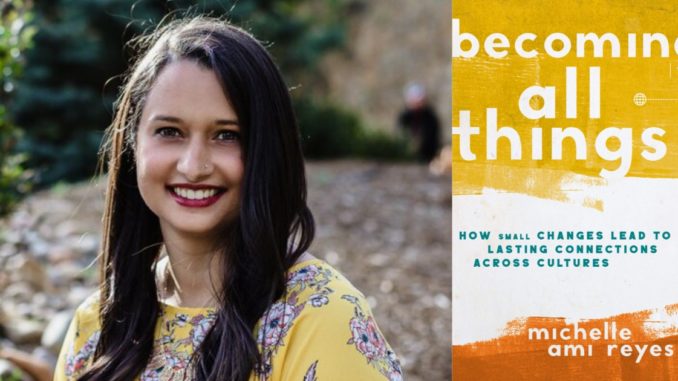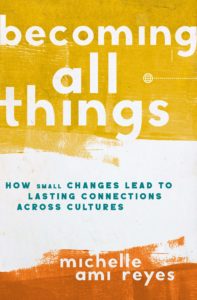
Podcast (beyond-the-page): Play in new window | Download
Subscribe: Apple Podcasts | RSS
In 1963, Martin Luther King Jr. said that “It is appalling that the most segregated hour of Christian America is eleven o’clock on Sunday.” Almost sixty years later and his words continue to ring mostly true. Even congregations that pride themselves on diversity are rarely multi-cultural. In Becoming All Things, Michelle Ami Reyes gives a blueprint for true multiculturalism in the church, one that values and upholds all people and all cultures. I recently had the chance to talk with Dr. Reyes and the conversation was really quite incredible.
The Conversation | Michelle Ami Reyes
This excerpt is lightly edited for conciseness and clarity
Josh Olds: Now, I want to start personally with your story. How did you come to write this book?
Michelle Ami Reyes: Yeah, well, so my my husband and I—His name is Aaron, he’s a second generation Mexican American and I myself am second generation Indian American. We are church planters in Austin, Texas. And, you know, Oh, goodness, you know, over a decade ago we felt the call to church plant. We planted Hope Community Church in 2014, here on the east side, and we just feel passionate about the call to speak into spaces of culture and race and justice through vocational ministry and advocacy.
I feel like through church planting in East Austin, which is a historically disadvantaged Black and Brown community, you can still see the effects of segregation today. And even just day to day vocational ministry entails crossing cultures between African Americans, Asian Americans, Latinos, immigrants, and we just have a passion for all of those demographics being represented in our church, being represented in the leadership of our church, impacting how we do ministry because we love the church. And we long to see it live out its calling and witness in the world.
we just feel passionate about the call to speak into spaces of culture and race and justice through vocational ministry and advocacy. – Michelle Reyes
We can look at Revelation 7:9 where we see this multi-ethnic, multicultural Body of Christ, worshiping God, and all of our languages and expressions and cultural identities. And there is this vision of the future of all of the people of God coming together, where there’s no culture or people group that’s superior over another, where the world sees us worshipping. And so that is, in many ways, my heart for why I wrote this book: it’s a resource for the church.
Josh Olds: Bringing cultures together and building diversity. I mean, that was one of the major issues of the early church, if you go back to, you know, the book of Acts and the Gentile and Jewish communities trying to figure out how to be believers together. I find it so interesting that 2000 years later, we are really having some of the same conversations and working out the same things. Building diversity is so difficult, whether that’s ethnic background, cultural background, language differences, socio-economic differences. There are just so many barriers to building a diverse church body. How has your church tried to navigate those challenges?
The majority of multicultural churches fail to fully live out a true multicultural expression in terms of an equal presence of values, thoughts, and communication, because they are limited to the extent that they can only be as diverse as their white congregants are comfortable
Michelle Ami Reyes: Yeah. There’s humility and love certainly. But you know, I think that there are some intentional ways that you can go about building multicultural—not just multi ethnic—but a multicultural church. It’s important to differentiate between those. Multi-ethnic does not translate to multicultural automatically. Multicultural means the existence and equal treatment of different cultural values, ideas, communication, style, different forms of worship, even different forms of leadership. And, by nature of that, if that truly exists in your church, that sort of multicultural body, it should be very uncomfortable. People will always be in a semi-state of discomfort.
The majority of multicultural churches fail to fully live out a true multicultural expression in terms of an equal presence of values, thoughts, and communication, because they are limited to the extent that they can only be as diverse as their white congregants are comfortable.…Because, we sometimes give lip service to diversity, but are those people in positions of power in the church? Are they steering the ship? Are they making decisions that impact the churches—discipleship and spiritual formation and finances and things like that? That’s a big difference between multi-ethnic versus multicultural.
So when it comes to our church, the pastors, the staff, the elders of our church—they are all people who grew up and were raised in East Austin. Latinos, immigrants, African Americans, Asian Americans, who get the community and who represent the community well. There’s a diverse spectrum of thoughts and ideas and even approaches to vocational ministry in our leadership at Hope.
The Book | Becoming All Things
 Cultural identities and cross-cultural engagement are not things that anyone can choose to ignore anymore, least of all Christians. Many of us want to have diverse friends and are passionate about justice. But if we are serious about cross-cultural relationships–real relationships that lead to understanding, healing and solidarity across cultural lines–we need to be willing to change. And that’s not something that comes easy for any of us.
Cultural identities and cross-cultural engagement are not things that anyone can choose to ignore anymore, least of all Christians. Many of us want to have diverse friends and are passionate about justice. But if we are serious about cross-cultural relationships–real relationships that lead to understanding, healing and solidarity across cultural lines–we need to be willing to change. And that’s not something that comes easy for any of us.
In Becoming All Things, Michelle Reyes offers a poignant discussion on the challenges surrounding cross-cultural relationships in America today, including the reasons for cultural difference, stereotyping, appropriation, gentrification, racism, and more. Seeking to deconstruct these things in our own lives, Reyes focuses on the concept of cultural accommodation in 1 Corinthians 9:19-23, and looks at the ways in which we need to adapt who we are in order to become all things to all people. The problems inherent in cross-cultural relationships have to do with us. We have to do better.
With language that’s witty, funny, and accessible, Reyes offers hope for majority and minority alike by showing what’s possible when all of us are willing to try something new.
The Author | Michelle Ami Reyes
 Michelle Ami Reyes, PhD, is an Indian American writer, speaker, and activist whose work on faith and culture has been featured in Christianity Today, Faithfully Magazine, Patheos, and more. She is also the Vice President of the Asian American Christian Collaborative and Editorial Director at Pax. Michelle lives in Austin, Texas with her husband, Aaron, and two kids.
Michelle Ami Reyes, PhD, is an Indian American writer, speaker, and activist whose work on faith and culture has been featured in Christianity Today, Faithfully Magazine, Patheos, and more. She is also the Vice President of the Asian American Christian Collaborative and Editorial Director at Pax. Michelle lives in Austin, Texas with her husband, Aaron, and two kids.
